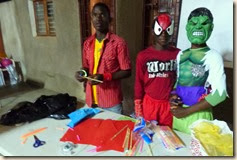 The children were laughing out loud as they strolled along
the beach, their worn-out flip-flops dragging through the sand. It was obvious
who was in charge, the big sister’s eyes glancing now and then at her two
younger sisters as they walked. Their clothes were clean though worn, their
hair black and braided, their eyes bright. These children had a mama at home
and had money for food, though not for new clothes.
The children were laughing out loud as they strolled along
the beach, their worn-out flip-flops dragging through the sand. It was obvious
who was in charge, the big sister’s eyes glancing now and then at her two
younger sisters as they walked. Their clothes were clean though worn, their
hair black and braided, their eyes bright. These children had a mama at home
and had money for food, though not for new clothes.OUT OF AFRICA
Trusting and following the One who does abundantly more than all we can ask or imagine.
August 14, 2015
WHEN WORLDS COLLIDE
 The children were laughing out loud as they strolled along
the beach, their worn-out flip-flops dragging through the sand. It was obvious
who was in charge, the big sister’s eyes glancing now and then at her two
younger sisters as they walked. Their clothes were clean though worn, their
hair black and braided, their eyes bright. These children had a mama at home
and had money for food, though not for new clothes.
The children were laughing out loud as they strolled along
the beach, their worn-out flip-flops dragging through the sand. It was obvious
who was in charge, the big sister’s eyes glancing now and then at her two
younger sisters as they walked. Their clothes were clean though worn, their
hair black and braided, their eyes bright. These children had a mama at home
and had money for food, though not for new clothes.October 20, 2014
VALDA
 Valda is three months old. Her skin is light, her cry weak
and her limbs stick-thin. She weighs 1.5kg. Valda is fighting for her life.
Valda is three months old. Her skin is light, her cry weak
and her limbs stick-thin. She weighs 1.5kg. Valda is fighting for her life.If you know anything at all about babies – had one, held one, heard one – you’ll know that a weak cry is a bad sign, stick-thin limbs, worse, and that to weigh 1.5 kg three months after birth is life-threateningly underweight.
 And yet, Valda continues day after day to fight. Her round
black eyes open wide and she watches the faces of the many people who come to
the nursery to pray, to love, to will some of their strength to her as they
hold her. Her skeletal frame is growing but she has no flesh on those bones to
pad out her wizened features. “Wizened” – a term used for old people fading gently
away after a long and active life. Valda, who has only just begun her
adventure. Valda, who has been placed upon the earth for such a time as this.
Valda, called, chosen, with a destiny to fulfil.
And yet, Valda continues day after day to fight. Her round
black eyes open wide and she watches the faces of the many people who come to
the nursery to pray, to love, to will some of their strength to her as they
hold her. Her skeletal frame is growing but she has no flesh on those bones to
pad out her wizened features. “Wizened” – a term used for old people fading gently
away after a long and active life. Valda, who has only just begun her
adventure. Valda, who has been placed upon the earth for such a time as this.
Valda, called, chosen, with a destiny to fulfil. We will continue to pray and believe. We’ve seen it so often,
the miracle of life taking hold when death tries to rob the world of a gift
such as Valda. I’m sure I can see it in those beautiful eyes as they watch me watch
her. I hold her close, almost weightless in my hands as I press my cheek to
hers and sing, “You will live and tell of His wonders...” Over and over I
repeat the words, a sing-song declaration that she is not alone and that she
will get through.
We will continue to pray and believe. We’ve seen it so often,
the miracle of life taking hold when death tries to rob the world of a gift
such as Valda. I’m sure I can see it in those beautiful eyes as they watch me watch
her. I hold her close, almost weightless in my hands as I press my cheek to
hers and sing, “You will live and tell of His wonders...” Over and over I
repeat the words, a sing-song declaration that she is not alone and that she
will get through.October 4, 2014
WALK, DON’T RUN
.jpg) I was a fast runner. I ran everywhere. I remember “running
an errand” for a teacher in primary school. While everybody else was in class, I
had a clear route, sprinting from one side of school to the other. I pushed my
legs to pump faster, willing my toes to skim the ground lightly as I bounded, unencumbered
by weight or gravity. I felt like I was flying.
I was a fast runner. I ran everywhere. I remember “running
an errand” for a teacher in primary school. While everybody else was in class, I
had a clear route, sprinting from one side of school to the other. I pushed my
legs to pump faster, willing my toes to skim the ground lightly as I bounded, unencumbered
by weight or gravity. I felt like I was flying. Weddings here go on for days. Church goes on for hours.
Invited for lunch? There’s no rushing off to get things done – it’s all about
celebrating together and it will probably turn into dinner. There’ll be none of
this “I’ll just pop in for an hour but then I’ll leave” nonsense. You’re there
for the long haul, you’re engaged, you’re accessible. Or you’re not there at
all.
Weddings here go on for days. Church goes on for hours.
Invited for lunch? There’s no rushing off to get things done – it’s all about
celebrating together and it will probably turn into dinner. There’ll be none of
this “I’ll just pop in for an hour but then I’ll leave” nonsense. You’re there
for the long haul, you’re engaged, you’re accessible. Or you’re not there at
all. In reality, running through my days may get more done in a
practical sense but at what cost? How many rich moments of relating to another
person have I missed by running? How much wealthier would I be in relationships
if I had learned years ago to walk, not run?
In reality, running through my days may get more done in a
practical sense but at what cost? How many rich moments of relating to another
person have I missed by running? How much wealthier would I be in relationships
if I had learned years ago to walk, not run? Today, did you look deeply into someone’s eyes and really,
truly listen to their response when you asked how they were? Did you lay an
encouraging hand on a child’s shoulder as they told you about their day at
school? Did you make a new friend, encourage an old one? Did you share a few
silent moments where words weren’t needed and a relationship grew out of
effortless companionship?
Today, did you look deeply into someone’s eyes and really,
truly listen to their response when you asked how they were? Did you lay an
encouraging hand on a child’s shoulder as they told you about their day at
school? Did you make a new friend, encourage an old one? Did you share a few
silent moments where words weren’t needed and a relationship grew out of
effortless companionship?January 9, 2014
FELIZ ANO NOVO!
Happy New Year!
There is no better way to usher in the new year than here in the sand with 170 excited children who call Zimpeto home.
It was busy, it was hot, it was noisy. We painted faces, we made hats and masks, we iced biscuits, we dressed up and we tried to make noise blowers with straws but... oh well, we’ll practise the noise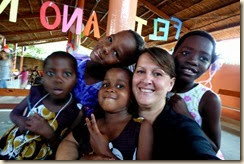 blowers for next year.
blowers for next year.
We did the Macarena and the Chicken Dance and the Hokey Pokey. We even played the Mummy Relay Game where four unsuspecting tios and tias (our child carers) got wrapped up in toilet paper by their dorm kids. Who won? Who cares!
We laughed till we had no more laugh left in us. We danced till our feet hurt. We worked up an appetite for the sausage sizzle that kept most of us going until the midnight fireworks. A few didn’t make it, dropping off to sleep on the benches i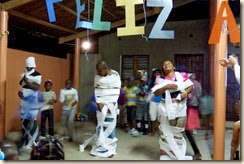 n the prayer hut then carried gently off to bed.
n the prayer hut then carried gently off to bed.
Right on midnight, the soccer field was set alight with the magical shapes and colours of fireworks and it felt like the whole city was celebrating with us: the Centre was surrounded on all sides by crackers and car horns and cheering as Maputo welcomed 2014
Feliz ano novo
to all from Zimpeto!
October 8, 2013
CHANGING THE WORLD
This morning I wondered whether to writ e today about one of Zimpeto’s kids... or about me.
e today about one of Zimpeto’s kids... or about me.
Should I tell you about Milton, our newest nursery resident with his smiling eyes and gummy grin, or perhaps update you on the remarkable recoveries of Lucia and Judite after months of life-threatening illness? I could tell you about the seven-year-olds who’ve learned to somersault wildly from the top of the climbing frame into the sand. Or about Kessane – everybody wants more news on our pin-up girl who’s now learning to walk.
Or, will I write about myself, Mozambique resident for more than five years now. Five years! I could write about the weddings I’ve attended, or the challenges I’ve faced, or the trips I’ve taken. The friends I’ve lost and the friends I’ve gained. Or about the latest life lessons I’m learning, of which there are so many...
And then I see it, and I am even more grateful for the years and the lessons.
The stories of Zimpeto’s children have became so inextricably woven now with the story of my own life’s journey that I can no 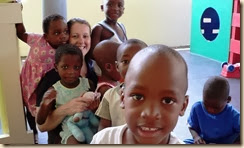 longer write about “them” and about “me”. I have lost sight of whose story belongs to whom and I am, beyond words, grateful that our stories have merged to brighten the colours of my life. I have been adopted into a family and am an apprentice learning through the suffering and the victories of those with whom I have the privilege to walk through these years.
longer write about “them” and about “me”. I have lost sight of whose story belongs to whom and I am, beyond words, grateful that our stories have merged to brighten the colours of my life. I have been adopted into a family and am an apprentice learning through the suffering and the victories of those with whom I have the privilege to walk through these years.
I shine brighter because of them, less troubled by the minutiae of each day, living more in that place whe re the little things count for little and the big things like life and death, happiness and grief, hunger , disease and healing are more sharply in focus, better informing my use of time and energy each day.
re the little things count for little and the big things like life and death, happiness and grief, hunger , disease and healing are more sharply in focus, better informing my use of time and energy each day.
I look back on past blog posts and remember the lessons. I rejoiced during Raquelina’s short life even as I learned to keep my soul’s balance when mourning her death. As I wrote the narrative of Pedrito’s nights spent walking Maputo’s streets, I discovered cold depths of bitter, condemning  unforgiveness in myself for the adults stalking him through the dark. When Milagrosa and Inacio then Rejoice and others left us to join their newly adoptive families, I grieved for my own loss and discovered that, at the same time, I could rejoice with all my heart at their gain.
unforgiveness in myself for the adults stalking him through the dark. When Milagrosa and Inacio then Rejoice and others left us to join their newly adoptive families, I grieved for my own loss and discovered that, at the same time, I could rejoice with all my heart at their gain.
The stories I tell here are stories running the gamut of the soul’s possibilities: the heights of joy and the depths of grief, wounds of the past eased by future hope; lives miraculously saved and, more often than I could ever have  imagined, lives tragically lost.
imagined, lives tragically lost.
As I tell the stories of Zimpeto’s children, I am thankful that I am here and that my story is enriched by being a part of theirs. My story has become inextricably woven with theirs and produced a life I could never have imagined for myself.
I came here to change the world and have discovered that, instead, the world is changing me.
October 6, 2013
ASK WHERE THE GOOD WAY IS
This is a repost of an article from 2008. Enjoy! (New posts coming when I sort out Blogger issues, I promise.)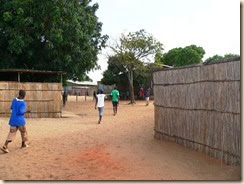
Yesterday the world was spinning faster than I had experienced for a long time. I am learning to say “espera por favor” with a smile. “Please wait…”
Needs to be met. Issues to be faced. Problems to be solved. Questions to which I must respond… now! Phones to be answered, again and again and again. There are days when I juggle three phones at once. I have learned to hold two conversations at the same time; after all, I have two ears and two hands.
Yesterday there were plans to be finalised, messages to be delivered, money to be sorted, accommodation to be organised, directions to be given, vehicles to be coordinated, transport to the airport for 37 people all at once… hugs, thanks, goodbyes… oh no, I forgot to find the lost suitcase! As the day progressed and the world turned faster and faster, my head began to spin with it. I wondered how to do everything that needed to be done without dropping the ball, my bundle or the many papers I was carrying around to reassure me that I was on top of everything.
ball, my bundle or the many papers I was carrying around to reassure me that I was on top of everything.
I headed for the Baby House to deliver a message. The plan was to be in and out in a moment. No time for distractions or play or loving on babies today.
Within seconds, I’d delivered my message but Lourenço had spotted me. I began to back out the door. He ran towards me, gathering momentum even as his feet tripped over each other. He leaned forward precariously as I began to turn away, his arms wide and face beaming even as I thought, “I don’t have time for you today.” As he reached me, he fell into my arms and I instinctively swung him into the air. Somehow my day was hijacked by the smile of a precious babe.
To think, I almost missed it.
As I held him, he placed one tiny hand on each of my shoulders and turned his head, leaning his 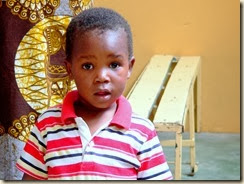 cheek firmly against mine. I felt his little body relax as he leaned against me. His breathing began to slow and deepen.
cheek firmly against mine. I felt his little body relax as he leaned against me. His breathing began to slow and deepen.
My day’s agenda faded as I held him close. I began to sing quietly to him, “Yes, Jesus loves you…” as his arms loosened and his hands dropped from my shoulders. The echoing noise of thirty children playing within the concrete walls of the Baby House faded as I focused on this one beautiful boy wanting a few moments of my attention.
Lourenço has no mother to rock him to sleep at night, no father to swing him high in the air and catch him as he squeals with delight. He has spent the first two years of his life without a family to remind him that he is loved and he is special and that there is 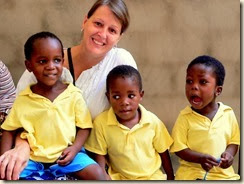 hope for him to be all that he wants to be in his life.
hope for him to be all that he wants to be in his life.
Yesterday, for a few moments he had me. It is not enough but it is something. Somehow my heart was captured, just for awhile, by a toddler innocent enough despite his losses to still believe that a hug is enough. He stirred an instinct in me so viscerally powerful that it took my breath away. To hold an orphan seeking love is worship of the highest order.
And so I surrendered, my heart taken captive by the guileless trust of a child. Somehow he knew that, as he ran and toppled in my direction, my arms would catch him and lift him high. This babe who has no earthly reason to trust, trusted me. It is why we are here: to catch them before they fall and lift them as high as we possibly can, holding them there until they can soar on their own.
For a few moments yesterday, the world stopped spinning, my heart stopped racing and rest took me over. I breathed out the busyness of the day as I sang over him. He was being filled and refreshed by love, 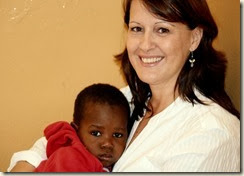 even as his tiny body relaxing lightly in my arms was refreshing me.
even as his tiny body relaxing lightly in my arms was refreshing me.
I swayed gently and continued to sing as he leaned his head back and his eyes gazed at my lips singing life over him. My back found the wall and I slowly slipped down and onto the cool concrete floor, babe in arms. His eyes drooped and closed and he fell asleep. All the riotous noise of thirty children faded into the background as I gazed at his sleeping face and thanked God for reminding me why I am here – to stop for the one.
“The one” in this moment was a toddler needing a cuddle. Perhaps the one tomorrow will be a Mozambican tia needing a smile or a staff member a word of encouragement for all the work he does. Perhaps it is, as today, one of the 60 or so visitors wandering the Centre, their hearts being stirred for a harvest field so ripe that they can smell the richness of the crop as they walk through the 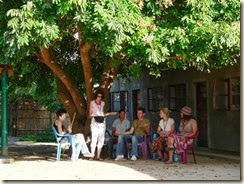 sand, praying and laughing and loving on our children.
sand, praying and laughing and loving on our children.
Today, Lourenço’s soul needed refueling, as did mine. He reminded me to slow down, to breathe, and to stop for awhile. As he slept in my arms, I poured love into him with my touch and my words and my prayers. I quietly thanked God for these moments, for using the outstretched arms of a toddler to draw me aside from the busyness of my day, reminding me that He leads me beside still waters and He restores my soul. I could so easily have missed it. Even on the busiest of days, He is my Restorer - and Lourenço’s.
Half an hour later and the world was no longer spinning, my heart no longer racing and my head now thinking more clearly about the next steps to take in this day full of challenges. I whispered my thanks to this little boy for giving me more than I could possibly give back to him. I handed him carefully to a tia and slipped away, walking more gently now, back into a day filled with opportunities to serve, one person at a time, wi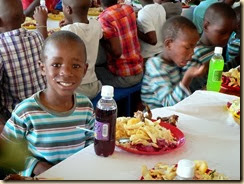 th a smile.
th a smile.
“…ask where the good way is and walk in it, and you will find rest for your souls.” Jer 26:16
Oct 2013 update: Lourenço is now a healthy, mischievous six-year-old. When he thinks none of his friends are watching, he runs up to me for a hug in the playground but is way too cool for this when all his mates are around. A glimpse of this sweet smile always lifts my heart and brightens my day.
July 10, 2013
LOST AND FOUND
Earlier this year we heard that Eugenio was missing. Five years old, innocent, sheltered, no street smarts. He was gone. He was playing in the sand with some of his friends not far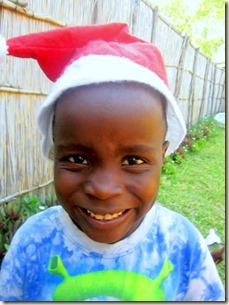 from his home and then he was gone.
from his home and then he was gone.
For several years, Eugenio lived here at Zimpeto, first in the Baby House and then in one of the smaller dorms. He was content here with his twin sister and a dorm full of pre-schoolers and he was thriving. But here is never the best place to be amidst the whirlwind of 260 children when there is the possibility of being with family, and Eugenio and his twin sister went to live with their grandma and auntie as soon as circumstances allowed. They were missed here but they were now where they belonged.
Within a few weeks of moving to his new house, Eugenio disappeared. When I heard that he was missing, my mind raced to all the awful possibilities. The most likely scenario was that he was wandering the baffling maze of sandy paths in the community, unable to find his way home. He lived in a house with no phone, behind a gate with no number, on a dirt track with no name. He had not lived there long enough to get to know the area around his house or to be known by the neighbou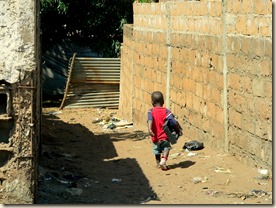 rs.
rs.
Or, had he joined the children playing in the huge open sewer pipes running along the main road where several had drowned the year before? Had he roamed onto the road and been hit by a car with the police having no way to find and inform his family?
Had he been taken without anyone noticing? Witchcraft is rife in Mozambique; child trafficking is common and often related to witchcraft. Last time I drove across the border to South Africa, my trunk was searched for children I might be smuggling out of the country to sell. Had Eugenio been taken out of Mozambique?
The family took his photo to the local TV station and, that night, his smiling face was seen in the living rooms of those Mozambicans who have electricity and are wealthy enough to own a television. This garnered no response.
By the time we at Zimpeto had heard of Eugenio’s disappearance, he had been gone for ten days. Ten whole days! He is five years old! Our team immediately began sending messages out across the world asking for prayer. A search party was organised for the next day.
The searchers were looking for a tiny needle in a huge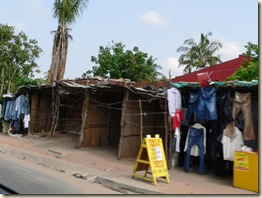 , huge haystack. Where to begin? Several cars full of willing volunteers left the Centre early on day eleven. They went first to Eugenio’s home to talk with his family, then to the police station, to the local stores and stalls, and to all the neighbours’ homes. They spread out, covering as much ground as they could. They showed his photo to everybody but he had not been seen.
, huge haystack. Where to begin? Several cars full of willing volunteers left the Centre early on day eleven. They went first to Eugenio’s home to talk with his family, then to the police station, to the local stores and stalls, and to all the neighbours’ homes. They spread out, covering as much ground as they could. They showed his photo to everybody but he had not been seen.
They prayed. And we prayed. And you prayed. Thank you for praying!
Around lunch time, a neighbour suggested a last-ditch attempt to find him: go to the local government-run orphanage: just possibly, if a kindly stranger had found him wandering the streets, they may not have taken him to the police station but to a children’s home and, just maybe, the children’s centre had not reported it.
Clutching at straws was all that was left to do... and clutching at straws succeeded.
After almost eleven days missing, our lost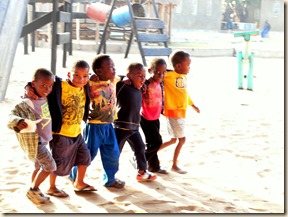 little boy was found. He was safe, fed, clean, healthy, and desperately happy to see his family.
little boy was found. He was safe, fed, clean, healthy, and desperately happy to see his family.
We all breathed a heavy sigh of relief and, ever since, have been whispering prayers of protection over our 260 kids.
These children have already been lost and found; once in a lifetime is more than enough.







